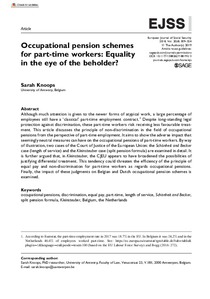Occupational pension schemes for part-time workers: equality in the eye of the beholder?

European Journal of Social Security
2018
20
4
December
309-324
precarious employment ; pension scheme ; discrimination
EU countries ; Belgium ; Netherlands
Employment
https://doi.org/10.1177/1388262718819513
English
Bibliogr.
" Although much attention is given to the newer forms of atypical work, a large percentage of employees still have a ‘classical' part-time employment contract.1 Despite long-standing legal protection against discrimination, these part-time workers risk receiving less favourable treatment. This article discusses the principle of non-discrimination in the field of occupational pensions from the perspective of part-time employment. It aims to show the adverse impact that seemingly neutral measures can have on the occupational pensions of part-time workers. By way of illustration, two cases of the Court of Justice of the European Union: the Schönheit and Becker case (length of service) and the Kleinsteuber case (split pension formula) are examined in detail. It is further argued that, in Kleinsteuber, the CJEU appears to have broadened the possibilities of justifying differential treatment. This tendency could threaten the efficiency of the principle of equal pay and non-discrimination for part-time workers as regards occupational pensions. Finally, the impact of these judgments on Belgian and Dutch occupational pension schemes is examined."
Digital
The ETUI is co-funded by the European Union. Views and opinions expressed are however those of the author(s) only and do not necessarily reflect those of the European Union or the ETUI.